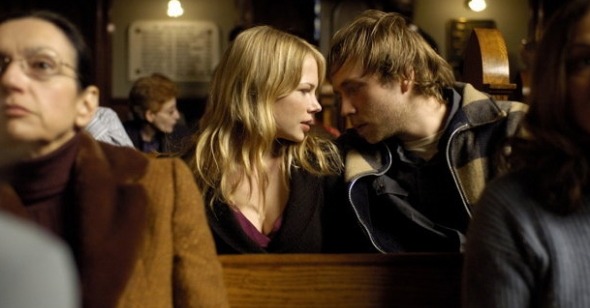True Colors
By Michael Koresky
The Hottest State
Dir. Ethan Hawke, U.S., THINKFilm
Over nearly twenty years, Ethan Hawke, despite playing a variety of roles in disparate genres, has managed to create a recognizable star persona for himself. Perhaps too recognizable for some, as he can be easily pigeonholed and has become a bit of a punching bag for those not on his wavelength. Hawke doesn’t necessarily disappear into roles, but instead has established his own funked persona, displaying enough trademark verbosity, grungy self-consciousness, and boho earnestness that it’s become all too simple to identify a part as essentially Hakwe-ish. Hawke’s recurrent character traits have been used to charming effect (Before Sunrise, Training Day), or for truly profound rumination, especially in his later Linklater collaborations (Tape, Before Sunset, Fast Food Nation)—although when called on to be stoic or overtly heroic (Snow Falling on Cedars, Hamlet), Hawke loses that elegantly manic edge that defines him onscreen.
On the evidence of The Hottest State, his latest directorial effort (after 2001’s Chelsea Walls), which is based on his own 1996 novel of the same name, Hawke knows where his own strengths lie. The film is content to dwell on the heart-on-sleeve shabbiness that Hawke has embodied since Reality Bites, confident enough to risk awkward intimacy in its depiction of the blossoming, then shriveling relationship between twenty-year-old actor-in-New-York William Harding (Mark Webber) and singer-songwriter Sara Garcia (Catalina Sandino Moreno). Hawke isn’t shy in showing that William and Sara, who meet randomly at a Williamsburg bar, come from perfectly sturdy middle-class backgrounds; the shabby chic comes across as an unpretentious survey of a particular generational moment, and Hawke never purports to pass off William and Sara’s angst as economic struggle. As Hawke explained in Before Sunset’s opening monologue, he writes what he knows: in this case how romanticism, here applied to the volcanic rumblings of young love, sometimes can feel in opposition to an indifferent world.
Of course, it’s largely up to the actors to make this sort of pared-down pas de deux work. Playing an obvious variation on a younger, more enthusiastic Hawke, Webber, who’s never been this verbal or alert onscreen (in other films he’s been often dour, eyes downcast), has also never seemed more right for a role—he’s surprisingly likable both as a blurting, confident courter and as a heartsick empty shell. Meanwhile, Sandino Moreno again enchants, juggling playful shyness, burgeoning sexuality, and finally, baffling betrayal. Hawke encourages the actress’s rare, glowing timidity, which is truly uncommon to film. Though Sara is meant to be something of an abstraction (the film is, of course, from William’s point of view), the actress shows enough warmth and quiet inner conflict to make us understand his love for her as well as her inexplicable need to move on. Most importantly, Hawke never demonizes Sara, who in other films could be seen as villainously indifferent, according her a respectful distance. In one especially nice wintry moment outside her mother’s house, Sara rebuffs William’s sexual advances when he doesn’t have a condom. “You wanna get me pregnant?” she asks directly. When he responds affirmatively from off-screen, she delivers the line, with no actorly grandstanding “Don’t say that.” And Hawke leaves his camera trained on her reaction.
This is tender, fragile stuff, and it does flirt with overt solipsism, yet Hawke, who also does some nice supporting work as William’s gravelly-voiced absentee father, pulls it off. The storytelling isn’t necessarily fluid, but each scene moves ahead with the force of its characters’ desires, confusions, and yearnings. And there’s nothing particularly showy or pretentious in the filmmaking, just the accumulation of moments both lovely and painful (too often, however, underlined by Jesse Harris’s song score, which the film doesn’t need to rely on as much as it does). Hawke obviously feels indebted to seventies American cinema: there’s an opening flashback that looks quite stunning yet doesn’t make chronological sense (if William was conceived in the late 1970s, then how can he be twenty years old in a contemporary environment teeming with anti-Bush sentiment?). as much as the mid-1990s indie flood of which he was an integral part. And his film acts as a fitting homage to both.
